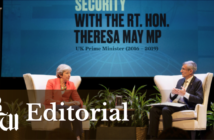“Hi! Hope you are doing well. I was wondering if you could please send over the revised project when you get a chance. So sorry for the inconvenience. Thanks so much!”
We’ve all likely sent or received this sort of email thousands of times, whether it be in a collegiate setting or a professional one. And usually, the sender is a woman.
At first glance, there may not appear to be any issue with this message. The phrasing and punctuation is warm and low-pressure, the tone friendly and easily palatable.
Despite its kindness, however, much of the terminology intended to “soften” the message ultimately undermines the purpose behind it.
From the hesitant “I was wondering” to the apologetic “so sorry for the inconvenience,” small permissive phrases can subtly demonstrate a lack of authority, leading emails to come across more as requests than demands.
Even so, this is often how women — even high-up business executives — are conditioned to communicate in the workplace. The harsh reality is that society seems to put different pressures on male and female business professionals, whether we are overtly aware of them or not.
When a male executive gives employees a direct order, he is often considered confident, powerful and authoritative. A female doing the same thing, however, may be deemed aggressive, cocky and rude.
Studies indicate that women are more likely to insert uncertain phrases like “I think” and “I feel” before qualifying statements and use exclamation points more frequently in emails.
One may propose the solution is for women to simply email more confidently. That they should cut out the “permissive” phrases, getting straight to the point regarding what they want and when they want it. One may advise women to simply “email more like men.”
But this advice is in itself part of the problem.
The fact that emailing — or doing anything, for that matter — “like a man” is a normalized expression demonstrates deep-rooted misogyny. Women professionals should be taken seriously on their own accord, without feeling obligated to “write” or “speak” like a man.
That being said, combatting this issue requires change at an institutional level.
Sure, individuals could change their personal habits in hopes of evoking change. Even so, a female executive adopting a more direct, less emotive communication style could put her reputation at stake.
And this concept goes far beyond just email etiquette.
In the workplace, female business professionals are constantly pressured to tone themselves down to appear gentler and less intimidating than their male counterparts.
And no, this isn’t to say that big wig CEOs are blatantly telling female employees to “tone it down” and “be kinder.” It is instead more subtle aspects of company culture that perpetuate this misogyny.
Women often speak faster in group settings to ensure they get their point across before getting cut off, and similarly use words like “um” and “like” to deter others from interjecting.
A study conducted by George Washington University indicated that men interrupt 33% more often when speaking to a woman than another man.
This gender imbalance is present in many facets of life, whether it be higher education or the U.S. government.
To investigate this concept, researchers from Northwestern’s Pritzker School of Law looked back at 15 years of Supreme Court oral transcripts. They found that over the past 12 years, female justices being interrupted accounted for 32% of overall interruptions, while female justices interrupting others accounted for only 4%.
In addition to analyzing interruption, the study also looked at language used by justices of both genders. Results showed that female justices were more likely to say, “may I ask?” or “excuse me” as a way to politely jump into the conversation.
It’s a bit scary to consider how these stereotypes manifest not only in the workplace, but in the government, as well. And as these habits become normalized in adult company culture, they are likely to have a trickle-down effect on young girls, too.
Studies indicate there seems to be a pressure on young girls to be more submissive, while boys are rewarded for being humorous and tough.
After asking children in the UK what they thought their friends would say are the most important qualities in boys and girls, The 2022 Good Childhood Report found that “being good looking” was the most popular response from both genders. “Being caring” was valued as second most important for girls, while “being funny” was for boys.
Teenage girls also tend to text in all lowercase as a way to seem less aggressive.
By now we’ve painted a pretty good picture of the problem, so what can we, as college students, do about this?
While it is ultimately impossible to disassemble a concept as huge as misogyny in the workplace, becoming more aware of it is key. Don’t react to messages based on who is speaking, but instead formulate your opinions based on what was said. By noticing these trends, we can at least attempt to even the playing field between men and women, whether it be in the classroom or the office.






Comment policy
Comments posted to The Brown and White website are reviewed by a moderator before being approved. Incendiary speech or harassing language, including comments targeted at individuals, may be deemed unacceptable and not published. Spam and other soliciting will also be declined.
The Brown and White also reserves the right to not publish entirely anonymous comments.